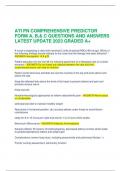-
1. Exam (elaborations) - 2023 ngn new generation comprehensive of ati exam retake 2023 with 100% correct quest...
-
2. Exam (elaborations) - {ngn}ati rn comprehensive predictor 2023 retake updated on may 2023 {ngn}ati rn compr...
-
3. Exam (elaborations) - All new generation ati comprehensive exit exam 2023 with ngn (answer key included at ...
-
4. Exam (elaborations) - Ati comprehensive exit exam retake 2023 all new gen | 180 verified q & a| ati compreh...
-
5. Exam (elaborations) - 2023 new ati-rnvati=comprehensive predictor 2019 form a,b , c and d=vati-rn=comprehen...
-
6. Exam (elaborations) - 2023 ati-rn=comprehensive predictor 2023 =form a,b &c=updated version test bank
-
7. Exam (elaborations) - 2023 ati-rn=comprehensive predictor 2023 =form a,b &c=updated version test bank
-
8. Exam (elaborations) - Ati pn comprehensive predictor form a, b,& c questions and answers latest update 2023...
-
9. Exam (elaborations) - Ati comprehensive exit exam retake 2023 360 verified d &a latest update
-
10. Exam (elaborations) - 2023 ati-rn=comprehensive predictor 2023 =form a,b &c=updated version test bank
-
11. Exam (elaborations) - Ati pn comprehensive predictor form a, b,& c questions and answers latest update 2023...
-
12. Exam (elaborations) - 2023 ati rn proctored comprehensive predictor form a 180 questions with answers (rate...
-
13. Exam (elaborations) - Ati rn capstone proctored comprehensive assessment 2019 b test questions and answers ...
-
14. Exam (elaborations) - Ati comprehensive exit exam retake 2023
-
15. Exam (elaborations) - Ati comprehensive exit ngn predictor 2019 real 180 exam testbank questions and answer...
-
16. Exam (elaborations) - 2023 april rn ati capstone proctored comprehensive assessment b | ati comprehensive p...
-
17. Exam (elaborations) - Ati comprehensive retake 2019 with ngn comprehensive predictor retake 2019
-
18. Exam (elaborations) - Ati comprehensive exit exam 2023 with ngn and verified guaranteed pass latest update ...
-
19. Exam (elaborations) - Ati rn vati comprehensive predictor 2023 form a , b and c ati rn ati comprehensive pr...
-
20. Exam (elaborations) - Updated 2023 ati rn fundamentals online practice (form a) ngn graded a+++ questions &...
-
21. Exam (elaborations) - Ati comprehensive exit final exam actual exam questions and correct detailed answers ...
-
22. Exam (elaborations) - Ati comprehensive exit final exam actual exam questions and correct detailed answers ...
-
23. Exam (elaborations) - (ngn) ati comprehensive exit exam 2022/2023 2023 - 2024 actual exam questions and cor...
-
24. Exam (elaborations) - Ati rn vati comprehensive predictor 2023 form a , b and c ati rn ati comprehensive pr...
-
25. Exam (elaborations) - 2023 ati rn maternal newborn proctored 2019 ngn (revised full exam).
-
26. Exam (elaborations) - Ngn 2023 ati rn nursing care of children proctored exam (7 latest versions graded a a...
-
27. Exam (elaborations) - Ati comprehensive exit final exam actual exam questions and correct detailed answers ...
-
28. Exam (elaborations) - 2023 ati pn comprehensive predictor real exam graded a
-
29. Exam (elaborations) - 2023 new ati-rnvati=comprehensive predictor 2019 form a,b , c and d=vati-rn=comprehen...
-
30. Exam (elaborations) - 2023 new ati-rnvati=comprehensive predictor 2019 form a,b , c and d=vati-rn=comprehen...
-
31. Exam (elaborations) - Ati exit exam ii version of comprehensive retake test 2023 exam 2023 - 2024 actual ex...
-
32. Exam (elaborations) - Ati rn capstone proctored comprehensive assessment 2019 b test questions and answers ...
-
33. Exam (elaborations) - Ati exit exam ii version of comprehensive retake test 2023 exam 2023 - 2024 actual ex...
-
34. Exam (elaborations) - 023 hesi lpn latest comprehensive final exit exam
-
35. Exam (elaborations) - Ati rn comprehensive predictor retake 2023 update south university west palm beachnur...
-
36. Exam (elaborations) - Ati pn comprehensive exit exam 2023 with ngn
-
37. Exam (elaborations) - Ati rn comprehensive predictor 2023 form a
-
38. Exam (elaborations) - 023 hesi lpn latest comprehensive final exit exam
-
39. Exam (elaborations) - Ati rn comprehensive predictor 2023 form a
-
40. Exam (elaborations) - (ngn) ati rn comprehensive predictor retake q & as latest retake exam guaranteed succ...
-
41. Exam (elaborations) - Ati comprehensive exit exam 2023
-
42. Exam (elaborations) - Ati rn comprehensive predctor 1st retake guide 2019 latest update 2024 graded a+
-
43. Exam (elaborations) - Bsg final exam / bsg final exam 2024 version/ bsg final comprehensive exam new questi...
-
44. Exam (elaborations) - Ati comprehensive exit exam with ngn latest update 2024 180 question and answers 100%...
-
45. Exam (elaborations) - Ati fundamentals b practice, comprehensive 2019, c.p. form a, nunya a, cc proctor 4 (...
-
46. Exam (elaborations) - Ati comprehensive exit exam retake 2023
-
47. Exam (elaborations) - Ati fundamentals b practice, comprehensive 2019, c.p. form a, nunya a, cc proctor 4 (...
-
48. Exam (elaborations) - Exam ngn ati comprehensive exit exam 2023 with ngn (180q&a nclex) ati comprehensive e...
-
49. Exam (elaborations) - Ati fundamentals b practice, comprehensive 2019, c.p. form a, nunya a, cc proctor 4 (...
-
50. Exam (elaborations) - Ati comprehensive exit exam / ati comprehensive exit retake exam revised 2024
-
51. Exam (elaborations) - Ati comprehensive final latest actual exam 2024- 2025 with correct questions and veri...
-
52. Exam (elaborations) - Ati rn vati comprehensive predictor with ngn |already graded a|100% pass|download to ...
-
53. Exam (elaborations) - 2024 rn comprehensive predictor nursing -study guide final update pass a+
-
54. Exam (elaborations) - Ati pn comprehensive predictor practice b / pn comprehensive predictor practice b [ l...
-
Show more




